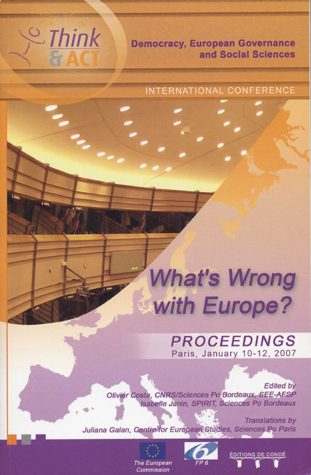
Olivier Costa and Isabelle Janin (dir.) What is wrong with Europe? Democracy, European Governance and Social Sciences, Paris, Editions de Condé, 2007
Since the early
1990s, the European Union has often been described as a process “in crisis”;
at present such a conception is once more in vogue.
Although it is becoming commonplace, it still remains that the European Union
has recently suffered great hardship, which deserves consideration, i.e. rejection
of the Constitutional Treaty by France and the Netherlands, EU budget conflict,
divergences concerning EU enlargement strategy, tensions about various issues
between national and European levels of government, etc.
This well-known situation of crisis requires careful thought to understand the
weaknesses of the EU political system and the conditions of its media coverage
and legitimisation. It involves a reconsideration of the concept of “governance”.
Not many concepts are as polysemous and vague as this one: according to Roderick
Rhodes, it can be defined in quite six different ways only concerning social
sciences field. Generally speaking, it derives from the need for both economics
and political science to have a concept which can cover what the too restrictive
concept of “government” can’t do anymore, i.e. the interactions
between the executive bodies / branches, the assemblies / legislatures, the
arbitral organs / judiciaries, and non-institutional actors (lobbies, experts,
NGO, etc.).
Since the 1990’s, the European Commission has been resorting to it, and
gave its own conception of it in the White Paper on European Governance (July
2001), in which it refers to the rules, processes and behaviours that affect
the way powers are exercised at the EU level. It stresses especially on five
principles of “good governance” (openness, participation, accountability,
effectiveness and coherence), designed to reinforce those of subsidiarity and
proportionality.
Thus, applied to the European Union, “governance” is a two-sided concept:
a descriptive one for social sciences use ; a normative one for the European
Commission. However, these two approaches are connected. At first, academics
were closely involved in the White Paper drafting. Moreover, ad hoc organs,
such as the Forward Studies Unit, have been set up to help the Commission to
take into account the academic literature on European governance. Finally, within
the 4th, 5th and 6th Frameworks Programmes, the Commission has encouraged the
development of social sciences research on European governance. The aim of these
projects was to improve the latter, both in terms of EU policy-making effectiveness
and EU institutions legitimacy. In this respect, the European governance appeared
to be also a response to the democratic deficit issue.
Although many large-scale pieces of research were financed in that way by the
European Union, their actual impact on EU institutions and EU policy-making
remains rather delicate to be assessed. Furthermore, if the European Commission
is paying attention to the potential contribution of these pieces of research
to its activity, this is not the case of the other public actors in the European
multi-level governance system: local, regional and national authorities have
only a smattering of social sciences research on the European governance issue.
More generally, it is a recognized fact that such a research did not contribute
to ensure that public opinion was informed about the EU activity.